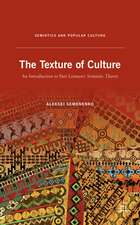Ubuntu Strategies: Constructing Spaces of Belonging in Contemporary South African Culture
Autor Hanneke Stuiten Limba Engleză Hardback – 2 sep 2016
Preț: 640.88 lei
Preț vechi: 753.97 lei
-15% Nou
Puncte Express: 961
Preț estimativ în valută:
122.64€ • 126.71$ • 102.02£
122.64€ • 126.71$ • 102.02£
Carte tipărită la comandă
Livrare economică 19 martie-02 aprilie
Preluare comenzi: 021 569.72.76
Specificații
ISBN-13: 9781137586391
ISBN-10: 1137586397
Pagini: 234
Ilustrații: IX, 240 p. 16 illus. in color.
Dimensiuni: 148 x 210 x 20 mm
Greutate: 0.43 kg
Ediția:1st ed. 2016
Editura: Palgrave Macmillan US
Colecția Palgrave Macmillan
Locul publicării:New York, United States
ISBN-10: 1137586397
Pagini: 234
Ilustrații: IX, 240 p. 16 illus. in color.
Dimensiuni: 148 x 210 x 20 mm
Greutate: 0.43 kg
Ediția:1st ed. 2016
Editura: Palgrave Macmillan US
Colecția Palgrave Macmillan
Locul publicării:New York, United States
Cuprins
Introduction Ubuntu Unchained: A Travelling Concept.- 1 Ubuntu and Common Humanity in the South African Truth and Reconciliation Commission.- 2 Ubuntu in Transit: From Divisive Pasts to Open Futures.- 3 Facing Others: Towards an Ethics of Ubuntu.- 4 “The Ubuntu Strategy”:The Commodification and Affective Politics of Ubuntu.- Afterword: Ubuntu Security.
Notă biografică
Hanneke Stuit is Assistant Professor of Literary and Cultural Analysis at the University of Amsterdam, The Netherlands and Researcher at the Amsterdam School for Cultural Analysis (ASCA).
Textul de pe ultima copertă
This book examines the ways in which ubuntu is continuously shaped and reshaped in different media in contemporary South African culture, such as literature, photography, cartoon art, journalistic fiction, and commercial television. It also studies ubuntu’s recent global dissemination and commodification, and critically assesses various approaches to ubuntu from different disciplines. From these various uses, ubuntu emerges as a powerful tool for thinking through problems of social in- and exclusion, and provides a nuanced perspective on what it means to strive for social harmony and communal unity. Ubuntu Strategies attends to the cultural production of ubuntu and argues that it is not just about being part of a common humanity, but also involves strategic decisions that balance self and other, particular and universal, local and global, difference and sameness, as well as violence and safety. The literary and cultural theoretical approach offered in Ubuntu Strategies thus provides a new perspective that addresses the role of representation in ubuntu, both supplementing and challenging legal and political inquiries of the concept.










